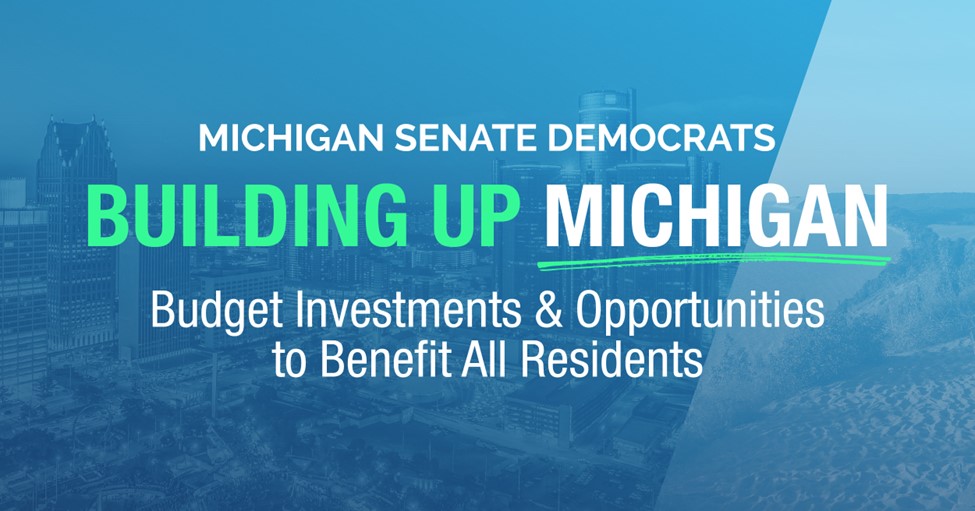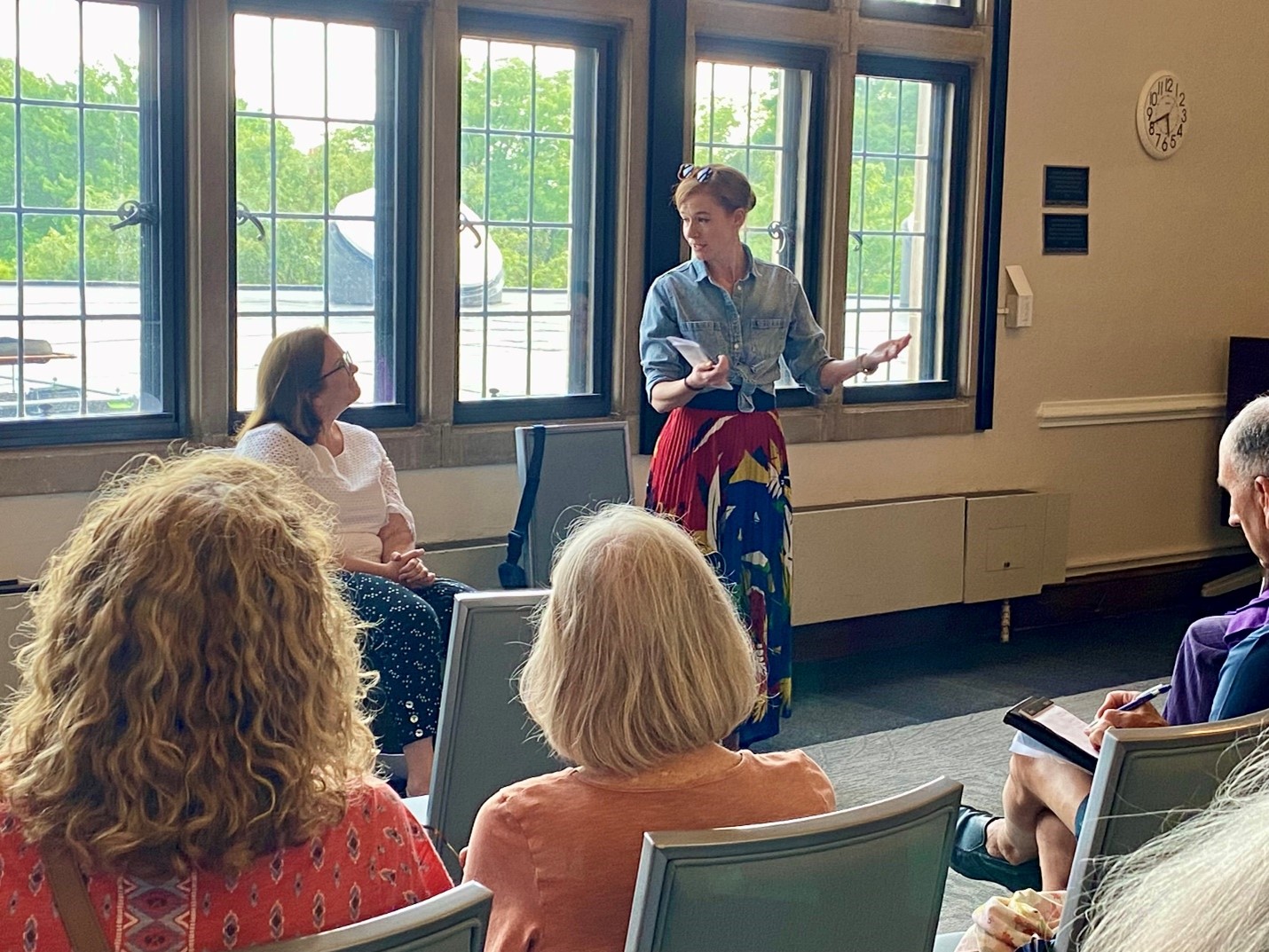
I hope that many of you were able to spend quality time with friends and family for the July 4th holiday weekend. I have spent some of that time reflecting on the 2025 State Budget that the Senate worked with Gov. Gretchen Whitmer to recently pass. While compromises must be made in the process, we designed a budget that builds up our vibrant communities and supports Michigan residents of all backgrounds. You will find information about the 2025 State Budget in addition to other updates from Lansing and the district in this e-Newsletter.
As always, if you or someone you know would like to provide any feedback about what’s happening in Lansing, or needs assistance of any sort, please feel free to reach out to my office. You can contact me by sending an email to SenMMcMorrow@senate.michigan.org or calling [517-373-2523].
Sincerely,

Mallory McMorrow
State Senator
District 8
Legislative Updates

Recently, the Senate successfully finished negotiations with the House on our Fiscal Year 2025 State Budget. In 2024 our budget directed vital resources into historically neglected sectors like infrastructure, education, and local communities. This budget builds on last year’s by continuing to invest in children and families, students and workers, public safety, community development, and more.
The state budget is both a values statement and a financial plan. Our cornerstones for the 2025 budget — transformational, innovative, equitable, and intentional — reflect the priorities established last year.
A few highlights are:
- Pays off a “mortgage” early (certain Michigan Public School Employees’ Retirement System liabilities), while protecting teacher pensions and retirement benefits, freeing up $670 million that can be invested into classrooms to help children learn.
- $50 million deposit into the Budget Stabilization Fund, which will bring the grand total in the rainy-day fund to nearly $2.2 billion by the end of FY25.
K-12 education
- $589 million spread across districts, ISDs, libraries, and community colleges to offset retirement costs. This saves K-12 districts the equivalent of more than $400 per pupil, equivalent to a 4.2% foundation allowance increase.
- $133 million, including $25 million in new funding, to continue historic investments for student mental health and school safety needs.
- $200 million to continue providing universally-free breakfast and lunch to Michigan’s 1.4 million public school students, helping students focus on learning and saving families $850 per year.
- $130 million for continued expansion of free pre-K to every 4-year-old in Michigan — two years ahead of schedule — saving families $10,000 a year.
Lowering costs
- $3 million to create the Secure Retirement program, a state-managed retirement plan marketplace that allows small businesses (fewer than 100 employees) to participate and provide retirement savings plans to their employees at no cost to the employer.
- $500,000 to continue the federal EBT summer food benefit program, which distributes $108 million in federal funds to ensure children have access to nutritional food throughout the summer months, saving families $120 per child.
- Continues the Working Families Tax Credit, which was quintupled last year, delivering tax relief to working families, directly benefiting half of all Michigan kids.
- Continues providing tax relief to Michigan seniors, following the 2023 repeal of the retirement tax, putting money back in the pockets of hundreds of thousands of households.
My office will be sharing more in the next few months. Find more details here.
Legislative Package to Establish a State-Based Health Insurance Exchange
We passed Senate Bills 633-638 to transition Michigan away from the federally managed health insurance marketplace to a State-Based Exchange (SBE), helping to provide the state with greater flexibility to meet the healthcare needs of Michiganders.
In the past decade, the Affordable Care Act has grown in popularity across the country and here in Michigan. During the 2024 open enrollment period, for example, 418,000 Michiganders purchased coverage through the federal marketplace, which was a 30% increase from the previous year and the highest enrollment rate in the state’s history.
This six-bill package amends Michigan’s insurance code to establish an SBE and lays out the parameters and duties of the exchange and governing board. As a result, the state would provide the infrastructure, website and support for individuals and small businesses to purchase plans beginning January 1, 2026.
This legislation now heads to the Michigan House for their consideration.
Expanding Freedom of Information Act
The Senate took a historic vote in support of bipartisan legislation to expand the application of the Freedom of Information Act (FOIA) to the Michigan Legislature and the governor’s office, a significant step forward to increase transparency within state government. Senate Bills 669 and 670 each passed with a 36-2 vote.
Enacted in 1976, Michigan’s FOIA law is one of the few in the nation that exempts state lawmakers and the governor’s office from records requests. This significant gap in the law contributed to Michigan receiving an F in government integrity from the national Center for Public Integrity’s 2015 report, where the state ranked last overall, failing in 10 out of 13 categories, including public access to information, executive accountability, and legislative accountability.
The bills now move to the House.
News You Can Use
Michigan Top in the Nation for Clean Energy Investments, Automotive Prowess
Business Facilities’ 20th Annual Rankings Report — which identifies leading locations for industries and helps inform site selectors’ decisions — has once again named Michigan as best-in-nation for the automotive industry, while also giving the state top spots in life sciences, semiconductors, EV investments, customized workforce training, and more.
Michigan was also recognized as a top ten state in the semiconductor industry thanks to investments from various companies and initiatives to develop talent, such as through the Michigan Semiconductor Talent and Technology for Automotive Research (MSTAR), a public-private initiative to make the state a world leader in automotive semiconductor technology and talent.
Michigan earned top 10 status for customized workforce training from Business Facilities, building upon another accolade for Michigan Economic Development Corporation’s Talent Action Team, who recently received global recognition as No. 4 most innovative business service in the world, according to rankings by Fast Company.
In addition to the Business Facilities rankings, Climate Power has once again named Michigan No. 1 for clean energy investments from the Inflation Reduction Act. This is the second year in a row that Michigan has been named to the top spot.
The Climate Power report indicates Michigan won 58 projects, securing nearly $25.4 billion in investments and 21,490 jobs, besting Texas, Georgia, California, and South Carolina as the top five states where projects are locating.
Protecting the Great Lakes from Invasive Species
Governor Gretchen Whitmer announced that Michigan signed an agreement with the U.S. Army Corps of Engineers and Illinois to cosponsor the construction of the Brandon Road Interbasin Project. This milestone agreement with the Biden Administration unlocks $274 million in federal and $114 million in state funding for the first of three phases of the $1.15 billion project that will prevent invasive carp and aquatic nuisance species from entering the Great Lakes.
Brandon Road Lock and Dam near Joliet, Illinois, is a critical point to stop invasive carp from moving into the Great Lakes. The Brandon Road Interbasin Project will implement a complex series of invasive carp and aquatic nuisance species deterrents.
Vision OPEN Challenge to Help Small Businesses and Start-ups Unlock $150 Million in Federal Funding
The Michigan Infrastructure Office has announced $10 million for the Vision OPEN Challenge, funded through the Make It in Michigan Competitiveness Fund, to help start-ups and small businesses secure funding from the federal Dept. of Energy’s (DOE) ARPA-E Vision OPEN 2024 grant. This challenge will provide matching grants to bring advanced clean energy and innovative technologies from the lab to the market. The DOE is offering up to $150 million in federal grants, with the Vision OPEN Challenge covering half of the required 10% match.
Initial applications to the Competitiveness Fund are due by July 15, 2024, to meet the DOE’s concept paper deadline of July 16, 2024.
These grants support the implementation of the MI Healthy Climate Plan and position Michigan as a leader in clean energy innovation and research. The investments will not only grow Michigan’s clean energy job sector, which added over 5,400 jobs in 2022 and now employs 123,983 people, but also have the potential to significantly boost the state’s economy. The World Resource Institute projects that by 2040, Michigan could create 41,000 new jobs in electric vehicle manufacturing and renewable energy, offering a promising future for the state’s workforce.
For more information, visit the Make It in Michigan Competitiveness Fund website.
Share your thoughts with the DNR at upcoming meetings
The Michigan Dept. of Natural Resources (DNR) is committed to providing Michigan residents with the opportunity to share input and ideas on policy decisions, programs and other aspects of natural resource management and outdoor recreation opportunities.
One important avenue for this input is at meetings of the public bodies that advise the DNR and, in some cases, also set policies for natural and cultural resource management. Frequently check the DNR boards, commissions, committees and councils webpage for updates.
The links below will take you to the webpage for each group, where you will find meeting details such as location and agenda (when finalized). Please check these pages often, as meeting details may change and sometimes meetings are canceled.
July Meetings
- Forest Management Advisory Committee – Wednesday, July 17, 1 p.m. (Contact: Kimberley Korbecki, 517-582-3204).
- Belle Isle Park Advisory Committee – Thursday, July 18, 9 a.m. (Contact: Barbara Graves, 517-284-6135).
- Board of Foresters – Thursday, July 18, 9 a.m. (Contact: Brenda Haskill, 989-370-9557).
- Nonmotorized Advisory Workgroup – Thursday, July 18, 10 a.m. (Contact: Annalisa Centofanti, 517-331-6219).
- Pigeon River Country Advisory Council – Thursday, July 18, 5 p.m. (Contact: Mark Monroe, 989-983-4101).
- Timber and Forest Products Advisory Council – Friday, July 19, 8:30 a.m. (Contact: Kimberley Korbecki, 517-582-3220 or 517-284-5876).
- Western Upper Peninsula Citizens Advisory Council – Thursday, July 25, 6 p.m. EDT (Contact: Stacy Welling Haughey, 906-226-1331).
Tips for Staying Healthy in Extreme Heat
Summer weather means getting outside and having fun or working in the yard, but too much heat can make you sick. Your body normally cools itself as your sweat evaporates, but during extremely hot weather, when the humidity is high, sweat can’t evaporate very well. Some individuals are more sensitive to the effects of high temperatures and may be at greater risk for heat illness, including:
- Infants and young children
- People 65 years of age and older
- People who are overweight
- People who overexert themselves during exercise or work
- People who are physically or mentally ill
- People with chronic medical conditions (heart disease, respiratory conditions, diabetes, etc.)
How to Stay Healthy
Heat related illness and death are completely preventable so it is important to understand what you can do to keep yourself healthy when temperatures are extremely high. Use common sense and be especially mindful of when the heat index is above 100 degrees.
- Keep cool indoors. Use an air conditioner or go to a cool place such as the basement, a neighbor’s house, shopping mall or cooling center. Even a few hours in the air conditioning will help you stay cool when you go back into the heat. Electric fans provide comfort, but they will not keep you cool when the temperature is in the high 90’s.
- Take a cool shower or bath
- Drink plenty of fluids to stay hydrated, don’t wait until you are thirsty (*warning: you should check with your doctor first if he or she has limited your fluid intake for medical reasons, such as with kidney disease). Avoid alcohol, caffeine, and sugary drinks such as pop. These beverages may dehydrate you even more.
- Avoid exercise and physical activity during the hottest time of the day. Mornings and evenings are usually cooler than mid-day. If you must exercise, drink 2-4 glasses of cool, non-alcoholic beverages every hour. Sports beverages can replace the salt and minerals you lose in sweat.
- Stay out of the sun. Wear sun protective clothing like a wide-brimmed hat and sunglasses and apply a broad-spectrum (UVA and UVB protectant) sunscreen SPF 15 or higher 30 minutes prior to going outside to protect yourself against sunburn.
- Check on family, friends and neighbors at least once a day during times of extreme heat. Help them get to a cool place if necessary.
- NEVER leave children, the elderly, or pets in parked cars. Cars heat up very quickly and can become dangerously hot, even with the windows open.
For more information:
- MIOSHA Heat Illness Awareness Website
- Heat Awareness and Safety fact sheet from the Michigan Department of Health and Human Services (MDHHS)
- Extreme Heat Prevention Guide from the Centers for Disease Control and Prevention (CDC)
AG Nessel Issues Consumer Alert on Alternative Gas Suppliers
Michigan Attorney General Dana Nessel is issuing a Consumer Alert regarding Alternative Gas Suppliers (AGSs) following numerous complaints about deceptive practices. Since the beginning of 2024, over 125 complaints have been filed with the Michigan Public Service Commission (MPSC) concerning AGSs.
AGSs are third-party companies authorized to sell natural gas to residents in the Consumers Energy, DTE, SEMCO, or Michigan Gas Utilities service territories. While these suppliers can offer competitive rates, AGS rates are not regulated by the MPSC, unlike rates from local utility companies.
All AGSs must be licensed by the MPSC. If a consumer encounters a company that is not licensed, the Attorney General advises them not to engage their services and to file a complaint with the MPSC.
Consumers interested in AGS services should:
- Ask AGS representatives to include details on how savings are calculated, the contract length, the per unit rate, and any associated fees;
- Understand the duration of any promotional pricing, the process, and fees for switching AGSs or returning to the local utility, and contract terms after promotional periods expire;
- Be aware of any cancellation fees and how the process works; and
- Check eligibility for budget plan customers and those with past due balances.
If a consumer believes an AGS has engaged in a misleading or deceptive promotion leading them to sign a contract, the Attorney General encourages them to file a complaint with the MPSC online or by calling 1-800-292-9555.
Consumers considering an AGS can learn more at the MPSC’s Natural Gas Customer Choice webpage, which includes information on licensed suppliers in each utility’s service territory. The Attorney General also encourages consumers to visit the MPSC’s Compare MI Gas website, which has answers to frequently asked questions about gas customer choice.
Tips to Help Protect Your Animals in Summer
Summer can be an especially dangerous time for not only our families and communities, but also our pets and animals. The Michigan Department of Agriculture and Rural Development (MDARD) has coordinated helpful tips to help keep your pets safe and cool over the warm summer months:
Provide unlimited, cool, clean, fresh water:
- Just like people, animals can quickly become parched in hot temperatures. No matter the species, animals should always have access to unlimited cool, clean, fresh water to prevent dehydration. If you bring your pet in public, be sure to bring along hydration options and avoid using communal water bowls.
Know your animal’s limits and ability to tolerate heat:
- An animal’s age, breed, type of coat, and health history — among other factors — can all play a role in their ability to tolerate heat. Keep an eye out for signs of heat stress, including increased panting or drooling and being more lethargic. If they are displaying any signs of heat stress, immediately move your animal to a cooler area.
Test surfaces to ensure they won’t burn paws:
- Surfaces like asphalt, concrete, and sand can really heat up in the sun, which can burn paws or make a walk extremely uncomfortable for your pets. To test if a surface is too hot, touch it with the palm of your hand. If the surface is too hot for you, it means that it’s too hot for your pet as well. Consider taking a different route that is mostly grass or waiting until the evening when everything has had a chance to cool down.
Avoid harmful algal blooms (HABs) in bodies of water:
- HABs form due to a rapid growth of cyanobacteria, also called blue-green algae, which are naturally found in lakes, rivers, and ponds. To prevent illness in your pets, keep them out of areas with scum or discolored water, rinse them off after contact with any lake water, and bring clean, fresh water for them to drink.
- If your animal becomes sick after contact with a suspected HAB, please call your veterinarian immediately.
- Animal illnesses due to HABs are also reportable to MDARD. To report cases, submit a Reportable Disease Form or call 800-292-3939. In addition, to report any suspicious looking algae, please email algaebloom@michigan.gov.
Do not leave animals in parked vehicles:
- Even when temperatures outside feel more moderate, vehicles often heat up very quickly, creating unsafe conditions for animals left inside. Leaving windows cracked open and/or parking in the shade does little to improve the situation. In these conditions, it is best to leave pets at home when you need to go out and about.
Ensure animals have a place to cool down:
- Animals know when they are too hot and will usually try to seek out a place where they can safely cool down. Make sure your pets have access to shades, fans, misters, pools, cooling mats, and/or air-conditioned spaces to help them stay comfortable and healthy.
In The Community
4th of July in Clawson

Team McMorrow had a great time walking in the Clawson parade. We gave out a lot of candy, had many high fives, flag (and pom pom) waving, and fun!
Community Conversation with Representative Natalie Price

Representative Natalie Price was kind enough to invite me to her community conversation in Birmingham this week. I highlighted some of the legislative and budget wins from the year, and we had great discussions.
Coffee Hour in Oak Park


Team McMorrow had a wonderful coffee hour yesterday at the beautiful new Mother Handsome café in Oak Park. We’re grateful that Representative Regina Weiss and Mayor Marian McClellan were able to attend as well!
For those who could not be there, one part of the discussion was about property taxes and disclosure of increases when buying a house.
Prop A was designed to limit the growth in property taxes by the Inflation Rate Multiplier (IRM) until ownership in the property was transferred. Under former Gov. Snyder’s administration, tax burdens were shifted to middle- and lower-income families for wealthy tax cuts.
Prior to Prop A, property taxes were based upon State Equalized Value (SEV). SEV is defined as 50% of the property’s true cash value. With Prop A, property taxes are now based on Taxable Value instead of the SEV, and each property has a Capped Value. This is calculated by multiplying the prior year’s Taxable Value, with adjustments for additions and losses, by the Inflation Rate Multiplier and cannot increase by more than 5%. For 2024, the IRM has been calculated by the State Tax Commission at 1.05.
It is good that if you are in your home a long time, your property taxes will not go up a lot. But when that home is sold, the taxes increase significantly for the new owner. To change this would require a constitutional amendment and ballot initiative, which would be a good idea, since it hasn’t been touched since 1994. In the meantime, us legislators can look into possible legislation requiring that any tax increase is disclosed to buyers prior to closing.
These conversations are valuable, and we appreciate the engagement from constituents and stakeholders.
Good News from the District
Twin Red Pandas Born at the Detroit Zoo

Recently, Ravi, a 7-year-old male red panda, and Ginger, a 3-year-old first time mom, welcomed twin cubs! They are getting stronger and fluffier every day, and their eyes should be opening any time now. For the next two to three months, Ginger will be caring for the twins in a nest box that provides a secluded, quiet space for her to tend to them. While waiting to meet the cubs, we can still visit Ravi in the red panda habitat!
